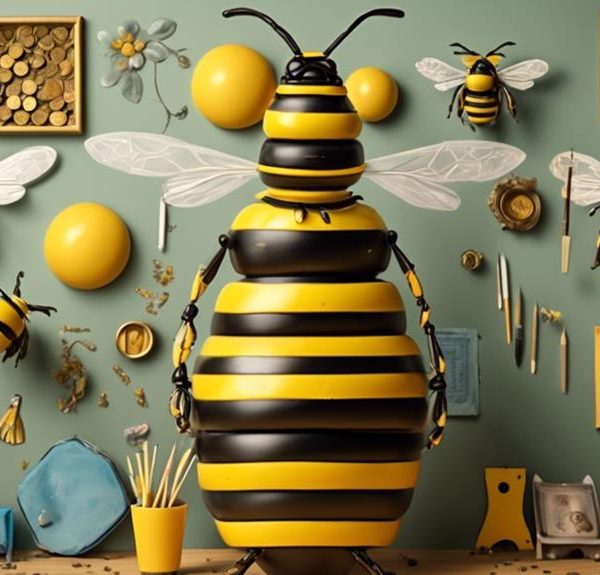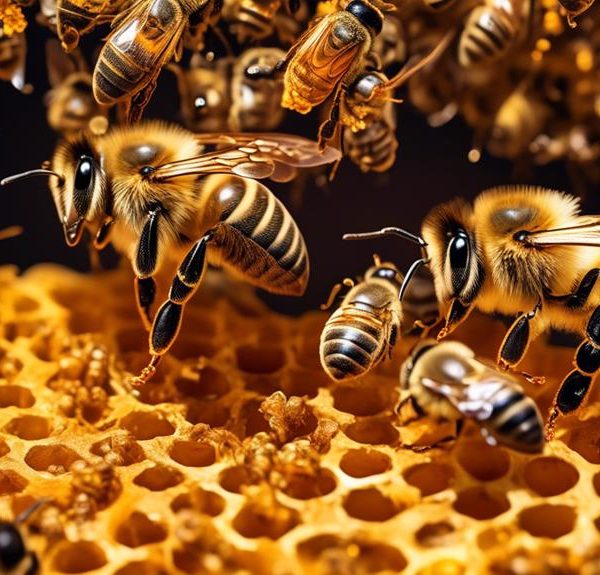Kickstart your knowledge about the health implications of eating beeswax; unveil its history, benefits, and possible risks.

Is Beeswax Healthy to Eat?
Drawing a parallel to the ancient Egyptians, who used beeswax in the preservation of food and the creation of sweet treats, you might wonder about the health implications of consuming beeswax in today's world. You've probably come across it as an ingredient in candies, desserts, and even some health supplements, but is it really safe, or even beneficial, for you to eat?
As we pull back the curtain on beeswax, you'll discover its composition, its historical uses in food, the potential health benefits, and the risks associated with its consumption.
Stay with us, because this journey into the heart of the hive is about to get intriguing.
Key Takeaways
- Beeswax is primarily composed of various compounds, including fatty acids, alcohols, and esters, and contains trace amounts of carotenoids, flavonoids, and vitamins.
- Beeswax has a long history of use in food preservation, such as coating cheese and preserving fruits, and was also used in pastries, desserts, and the production of Mead.
- Consuming beeswax may have potential health benefits, including antioxidant properties, vitamin A content for improved eye and skin health, anti-inflammatory properties for soothing wounds and skin conditions, and mild anti-bacterial properties.
- However, there are risks and side effects associated with eating beeswax, such as potential allergic reactions, gastrointestinal issues when consumed in large amounts, and the possibility of traces of harmful chemicals from pesticide use. It is important to understand individual tolerance levels and choose organic, unrefined beeswax from trusted sources.
Understanding the Composition of Beeswax
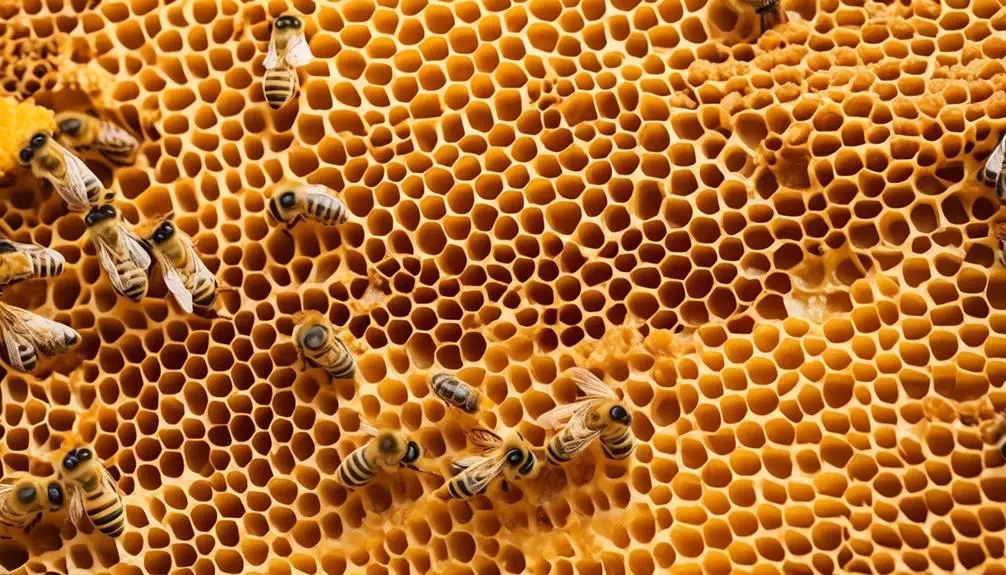
Often overlooked, beeswax is a complex substance with a unique composition that you should understand before deciding to incorporate it into your diet. It's primarily composed of over 300 individual compounds. Predominantly, there are long-chain fatty acids, alcohols, and esters, but it also includes trace amounts of carotenoids, flavonoids, and vitamins, particularly vitamin A.
You'll notice these constituents aren't typically found in large quantities in your everyday diet. The long-chain compounds can be quite hard to digest, which is why beeswax isn't usually consumed in large amounts. However, the presence of carotenoids and flavonoids, known for their antioxidant properties, makes it an intriguing dietary addition.
Moreover, beeswax's vitamin A content can aid in skin health and vision. But it's important to note that beeswax isn't a significant source of these nutrients. Your body would need a much more substantial amount than what beeswax can provide.
Historical Uses of Beeswax in Food
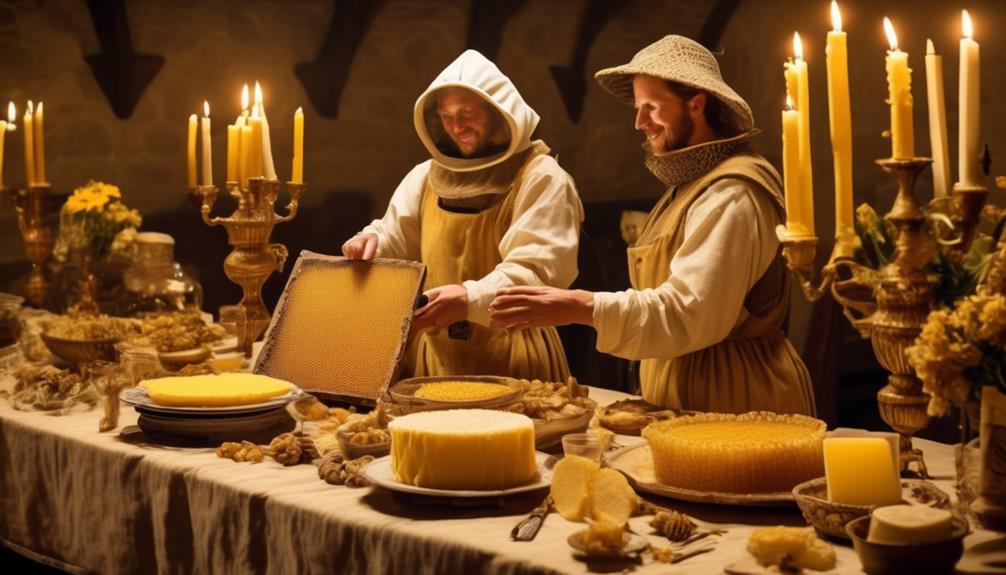
Diving into history, you'll discover that beeswax has been a versatile ingredient in food preparation for centuries. Ancient Egyptians used it for preserving fruits and other perishables, while Romans coated their cheese with beeswax to prevent mold and extend shelf life.
In the Middle Ages, beeswax was a common ingredient in recipes for pastries and desserts, contributing to their rich texture and unique flavor. It's even been used in the creation of the world's oldest known chewing gum, dating back over 5,000 years!
The use of beeswax wasn't just limited to the culinary world. You'd find it in the production of Mead, an alcoholic beverage made from fermented honey and water. Beeswax was used to seal the fermentation vessels, preserving the Mead and enhancing its flavor.
In modern times, you'll find beeswax in the making of sweets like jelly beans and gummy bears, used as a glazing agent to give them their shiny appearance. It's a testament to the diverse applications of beeswax in the culinary world throughout history.
However, while it's been used for centuries, the question of its health benefits and potential risks still remains.
Potential Health Benefits of Consuming Beeswax
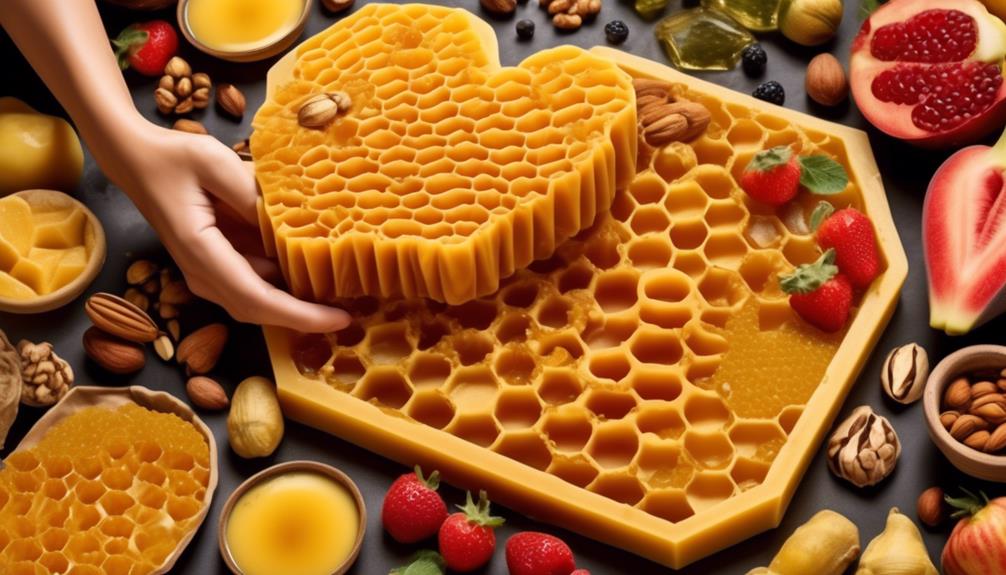
You might be surprised to learn that consuming beeswax could offer several potential health benefits, despite its seemingly unconventional use in the culinary world. It's a natural product that bees produce and serves as their hive's building material. But beyond that, it has properties that could be beneficial to human health.
Beeswax is rich in antioxidants which are essential in fighting off harmful free radicals in the body. They support overall health by boosting your immunity and preventing chronic diseases. It's also a good source of vitamin A, which is key for improving eye health and skin health.
Moreover, beeswax is known for its anti-inflammatory properties. This means it can help soothe and heal wounds, burns, and skin conditions like eczema and psoriasis. Its natural, non-allergenic, and moisture-holding properties make it a preferred ingredient in many cosmetic and skincare products.
Lastly, beeswax has mild anti-bacterial properties. Some studies suggest that it can inhibit the growth of bacteria and fungus, thus helping in preventing infections.
Bear in mind, however, that while beeswax has these potential benefits, it should be consumed in moderate quantities, and always as part of a balanced diet.
Risks and Side Effects of Eating Beeswax
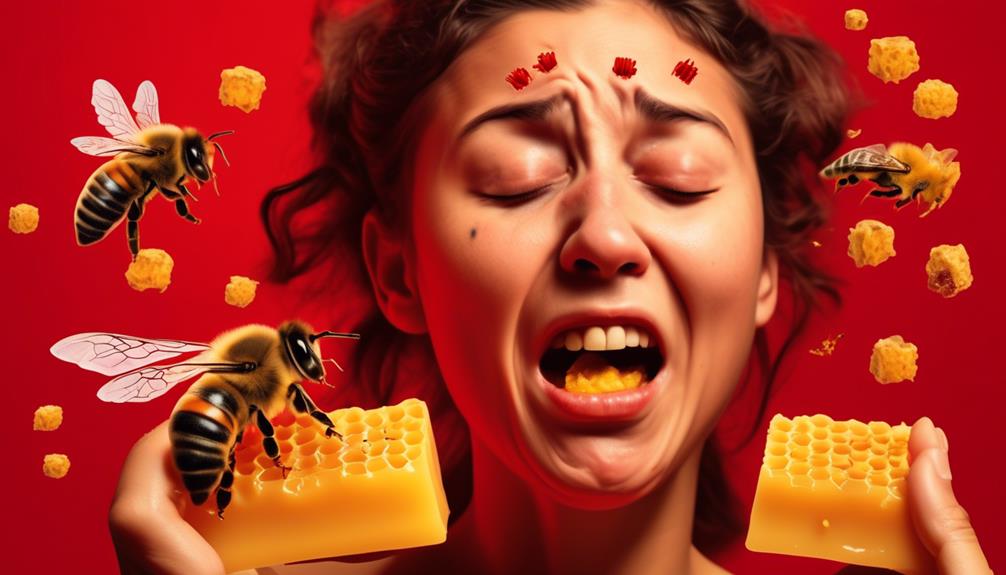
While beeswax can offer a range of health benefits when consumed in moderation, it's also crucial to be aware of the potential risks and side effects associated with its ingestion.
Just like any other food substance, beeswax isn't exempt from causing adverse reactions, particularly in individuals with specific allergies or sensitivities. Firstly, if you're allergic to honey or other bee products, you're likely to react negatively to beeswax as well. Symptoms can range from mild, such as skin rashes and itchiness, to severe, including difficulty breathing or anaphylaxis. Therefore, it's essential to understand your body's tolerance level before incorporating beeswax into your dietary regimen.
Secondly, the non-digestible nature of beeswax could potentially cause gastrointestinal issues, especially when consumed in large amounts. You may experience constipation, bloating, or an uncomfortable feeling of fullness.
Lastly, there's a risk associated with the source of the beeswax. Beeswax from areas with heavy pesticide use might contain traces of these harmful chemicals. Consequently, it's crucial to choose organic, unrefined beeswax from trusted sources.
Practical Ways to Incorporate Beeswax Into Diet

Despite the potential risks, incorporating beeswax into your diet can be a beneficial move, provided it's done with careful consideration of quantity, quality, and your individual health needs. Beeswax is typically used in small amounts as a natural food additive or a supplement. It's not meant to be a main component of your meals, rather it's an enhancer.
One practical method is to use it in cooking or baking. Beeswax can be used as a coating for cheeses or to glaze fruits, preserving their freshness while adding a unique flavor. You can also use it as a non-stick agent for cooking utensils.
Another way to incorporate beeswax is through dietary supplements. Beeswax capsules are available in the market, often mixed with other beneficial ingredients like honey or propolis. They're easy to consume and can offer various health benefits when taken regularly and in moderation.
Frequently Asked Questions
Can Beeswax Cause Allergies or Skin Reactions if Handled Extensively?
Yes, you could potentially have an allergic reaction to beeswax. It's not common, but if you're handling it extensively, you might develop contact dermatitis. That's an itchy, red skin rash.
Plus, if you're allergic to honey, you're more likely to have a reaction to beeswax. So, it's important to be aware of any allergies you might've before you start working with beeswax.
How Does the Taste of Beeswax Differ Between Various Types of Bees?
You'll find beeswax's flavor varies depending on the type of bee and the flowers they've visited. For example, honey bees yield a mildly sweet beeswax, while bumblebees produce a more robust, earthy wax.
But remember, you're not typically eating beeswax for taste alone. It's often used in foods for its texture and as a natural preservative. So, while it's interesting to note the flavor differences, they're usually subtle when used in food products.
Are There Any Ethical or Environmental Concerns Associated With Harvesting Beeswax?
Yes, there can be ethical and environmental concerns with harvesting beeswax.
Overharvesting can harm bee populations and their habitats. It's crucial to ensure bees aren't being exploited or harmed.
Sustainable farming methods, like using bee-friendly pesticides and leaving enough honey for the bees, can help.
Also, consider if the beeswax is ethically sourced.
Lastly, remember, bees play a vital role in our ecosystem through pollination, so their welfare is our concern too.
How Does the Nutritional Content of Beeswax Compare to Other Edible Waxes?
When comparing the nutritional content of beeswax to other edible waxes, you'll find it's pretty unique. It's not a significant source of vitamins or minerals.
However, it does contain a variety of bioactive compounds that can offer health benefits. Unlike other waxes, beeswax has anti-inflammatory and antioxidant properties.
But remember, it's not easily digestible, so it's best used sparingly in edible applications.
Can Beeswax Be Used in the Preparation of Vegan or Vegetarian Dishes?
Yes, you can use beeswax in vegetarian dishes, but not in vegan ones. Beeswax is an animal product, which vegans avoid. However, it's vegetarian-friendly as no harm comes to bees during its collection.
It's commonly used in food preparation for its texturing properties. Just remember, while it's generally safe to consume, it doesn't provide significant nutritional benefits. So, it's more for culinary creativity than health boosting.
Conclusion
In summary, beeswax has been historically used in food, and it presents potential health benefits. However, it's important to be aware of the risks and side effects.
Incorporating beeswax into your diet should be done cautiously. Always ensure it's in a form that's safe to consume. Despite its potential benefits, it's not a magic bullet.
Consult with a nutritionist or healthcare provider before drastically changing your diet.

